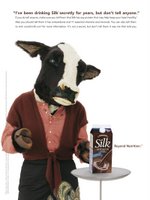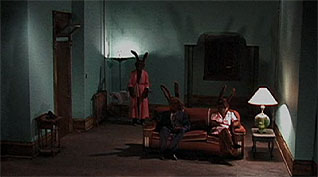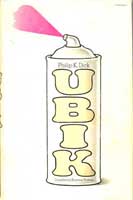The Empire never ended

I.
Have you seen these ads for Silk soymilk, featuring anthropomorphized cows? Click on the "Family" screen and...well, not enjoy. Be vaguely disturbed?
Inland Empire fans might be reminded of the "Rabbits" sitcom that various characters watch in that film...

The first appearance of the show in IE occurs fairly early—to me it felt like the first sign that we'd slipped down the rabbit-hole, à la Alice.
II.
Inland Empire—surely the best title of 2006, evoking both the "royal road to the unsconscious" and mysterious California—rendered everything afterward slightly dreamlike, much like Mulholland Drive (or is it "Dr"—"Dream"—as Hua recently suggested?) did. Shortly after watching it, I finished reading Philip K. Dick's Ubik, a book I'd been meaning to read since I was 14 or 15. The copy in the library back then looked like this:

Reading it post-IE, I imagined a dream (in both senses) pairing: Lynch directing Ubik. (PKD wrote a screenplay in '74; it was published in '85.) What most impressed me about the Lynch was the horrifying Möbius strip structure, the narrative never simply repeating but getting further degraded at each turn, an absolute corruption of borders—viewer/viewed, TV/theater, video/film, actor/character—so that at the end there's no escape. (Well, there is—in that ecstatic musical number at the end, which I didn't care for, but which perhaps serves as a psychic Band-Aid, a toe-tapper to send you out of the theater not feeling totally depressed/psychotic...sort of the way, per Greil Marcus, "(What's So Funny 'Bout) Peace, Love and Understanding" is a necessary release at the end of Armed Forces...)
There's a similar corruption going on in Ubik, a confusion between life and death, between competing versions of reality. Most freakishly, the very nature of time itself gets contaminated, messed up, maybe forever. At one point, various products, vehicles, etc. age dramatically, going back to their precursors—a car would get more and more antique, an elevator would eventually vanish, lethally (since it reached and surpassed the point in history when elevators were invented). The world is slowing down, at the same time the plot is accelerating—we're being pulled in two directions at once, and it's a dizzying sensation. This is where the horror of the book hits most viscerally, I think, as Joe Chip finds himself on a mission made all the more futile as his resources rot away by the minute. Inland Empire, shot on DV, nevertheless has a too-bright, or too-dark, or washed-out, even ancient feel—and it's this quality of the new infected by the old that suggests a perfect Lynch-PKD project.
(I know it'll never happen.)
III.
Is After Hours a retelling of The Wicker Man?

0 Comments:
Post a Comment
<< Home